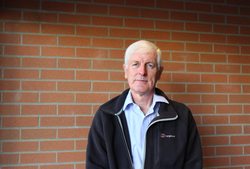Eleven international peacemakers from around the world visited congregations, presbyteries and colleges of the Presbyterian Church (U.S.A.) from Sept. 27-Oct. 21.
They shared their stories about church-based ministries in their countries that seek peace justice and pursue peace in the name of Jesus Christ. This year’s international peacemakers come from Bolivia, Colombia, Iran, Iraq, Israel/Palestine, Jamaica, Madagascar, Niger, Northern Ireland, South Sudan and Syria.
The International Peacemaker program is sponsored by the Presbyterian Peacemaking Program.
In 2012, the Rev. Wilfred Orr was presented with an Order of the British Empire (OBE) in the Queen’s honors list for “Service to Community Relations.” Throughout his time in Newtownbreda he has been a leading figure in the Ballynafeigh Clergy Fellowship and has worked tirelessly to promote both stronger ties between churches of all traditions in the district and between those from different cultural, social and political backgrounds. The proactive role played by the Ballynafeigh Clergy Fellowship is viewed as significant in contributing to this district remaining one of the areas in Northern Ireland most balanced between Protestant/Unionist and Catholic/Nationalist populations in spite of the polarizing impact of “The Troubles.”
During his international peacemaker itineration, Orr visited Missouri Union, Muskingum and John Calvin presbyteries and the Synod of Mid America.
What is the situation in your country that you addressed?
“I spoke about the historical context of our troubles and where we are in terms of our community relations in terms of events that had been planned with church groups to bring our disparate groups together. We’ve tried to do that through special church events like interchurch worship and also culturally through music. Thirdly, I spoke about how we’ve tried to enable the two sides to listen to the other person’s side of history.”
How are the faith communities addressing this situation?
“There was a flashpoint in Belfast over the last two summers. A conservative Protestant organization had some members who created antagonism as they marched past a large Catholic church. This created many angry headlines.”
Orr is part of a group called In Joyful Hope that does a shared Eucharist in which all participate as much as possible. It works to bring people together sooner rather than later, before we’re ultimately joined in Christ. That event was also covered by the media, sending a signal of peace.
“There’s a different way to share our cultural heritage than that which leads to strife.”
What lessons from your situation are you trying to communicate to U.S. Presbyterians?
“Wherever there is division, how do you work creatively within that? What opportunities are there to be creative in the name of Christ?”
A second lesson is patience and perseverance.
“Things may not work immediately. In Northern Ireland, we’re thinking in terms of two generations from now.”
What is the primary message you want to communicate to U.S. Presbyterians?
Orr paraphrased he learned from a journalist: Let the future — not the past — shape the present.
“In Northern Ireland, we have allowed ourselves to be shaped too much by the past. As a follower of Jesus Christ, I look to the new community that is coming.”

